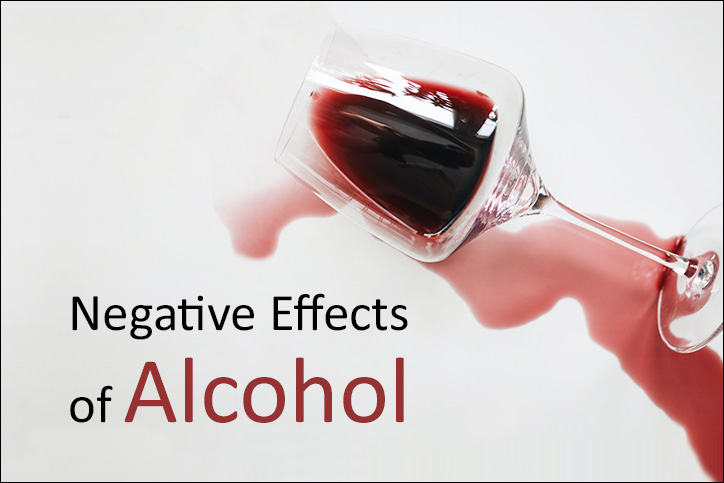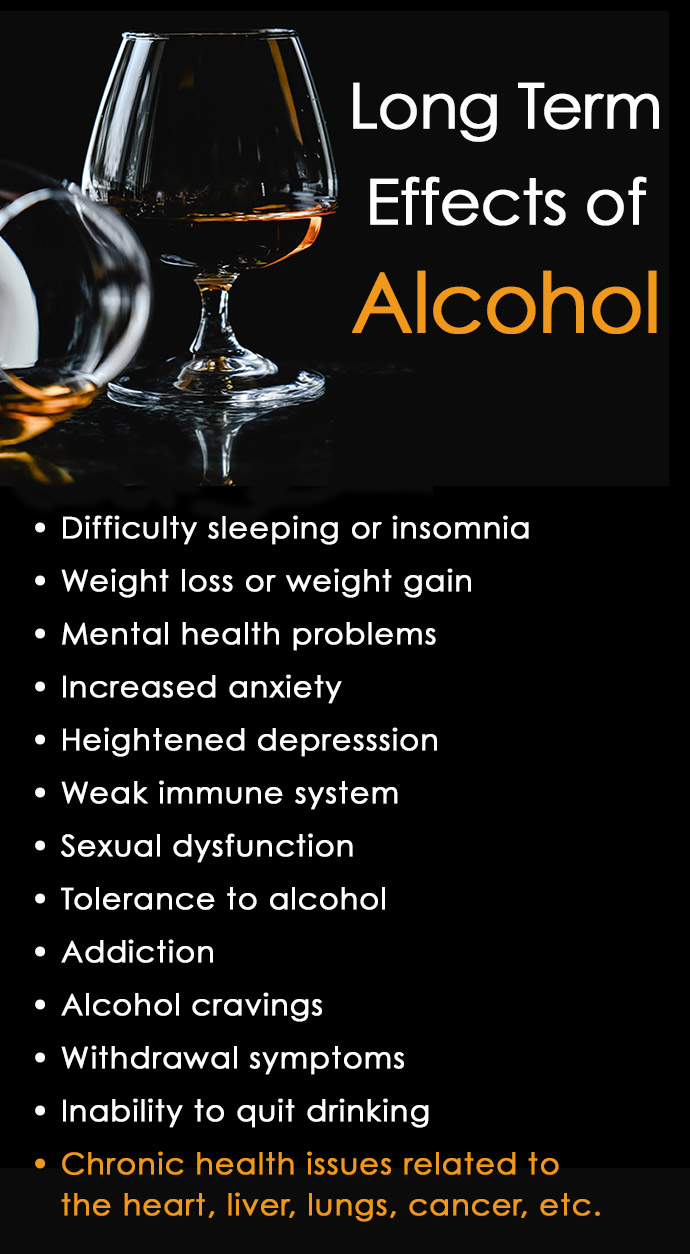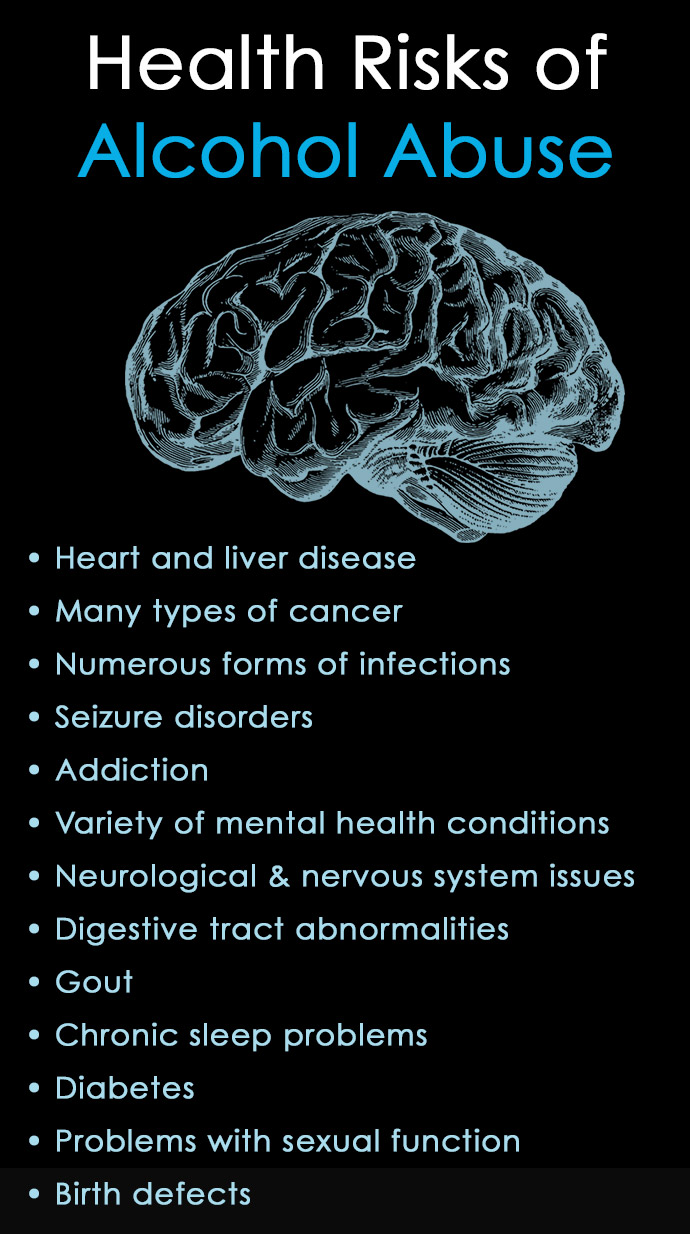Table of Contents
For most people, experiencing the negative effects of alcohol is often limited to a headache and feeling tired the day after a night of drinking with friends.
Even though recent research has shown that any amount of alcohol is considered to be unhealthy, many individuals who drink low levels of alcohol probably won’t notice too many adverse health risks.
For those who drink excessively, or consume moderate to high levels for many years, the negative effects of alcohol on the brain and body can cause serious health risks.
Although each individual reacts differently, there are many short and long term effects of alcohol, including addiction, withdrawal, and dangerous health conditions that can shorten a person’s life or make daily living a challenge.
An alcohol use study published in The Lancet found that alcohol consumption is linked to 60 different acute and chronic diseases, and is the seventh leading risk factor for death and a shortened life span.
Short-Term Effects of Alcohol
Many people will experience some short-term effects of alcohol regardless of how much, or how often they drink.
Some individuals will feel these effects quickly after one or two drinks, while others with a higher tolerance will require more to feel the same effects.
Common Short-Term Effects of Alcohol Include:
- Relaxed mood
- Feelings of happiness or euphoria
- Slurred speech
- Loss of coordination
- Confusion or difficulty concentrating
- Feeling tired or sluggish
- Slowed heart rate
- Suppressed breathing
- Intoxication
- Headache
- Nausea or vomiting
- Stomach pain or diarrhea
- Hangover after drinking
- Dehydration
- Experiencing blackouts
Most of the short-term alcohol effects will subside after a day or two after drinking and won’t generally lead to more serious health problems unless they become habitual.
Long-Term Effects of Alcohol
The long-term effects of alcohol are more severe and usually appear after prolonged alcohol use from years of drinking.
Some can also occur from frequently binge drinking large amounts of alcohol at one time.
Long Term Effects of Alcohol Can Include:
- Difficulty sleeping or insomnia
- Weight loss or weight gain
- Mental health problems
- Increased anxiety
- Heightened depression
- Weakened immune system
- Sexual dysfunction
- Developing a tolerance to alcohol
- Addiction
- Alcohol cravings
- Withdrawal symptoms when not drinking
- Inability to quit drinking
- Chronic health issues related to the heart, liver, lungs, cancer, and others
Studies have shown there is a clear link between cancer and alcohol.
The Effects of Alcohol on the Brain
The effects of alcohol on the brain can have an impact on many different areas and regions.
Here are the main regions of the brain and the bodily functions they control. The effects of alcohol on the brain will cause these areas to not function properly.
- Central Nervous System – thoughts, movement, and speech
- Hippocampus – memory
- Cerebral Cortex – judgment, inhibition, and pain
- Frontal Lobe – self-control and planning
- Cerebellum – balance and coordination
- Hypothalamus – blood pressure, heart rate, temperature, hunger
- Medulla – automatic actions like heart rate and body temperature
Serious Health Risks of Alcohol Abuse
As mentioned earlier, alcohol use has been linked to approximately 60 different acute and chronic diseases.
Some of the health risks of alcohol are temporary and will often subside if a person stops drinking, although others can be permanent and are not reversible.
Understanding the long term effects of alcohol can be a motivating factor for people to seek alcohol treatment.
Common Health Risks of Alcohol include:
- Heart and liver disease
- Many types of cancer
- Numerous forms of infections
- Seizure disorders
- Addiction
- Variety of mental health conditions
- Neurological and central nervous system issues
- Digestive tract abnormalities
- Gout
- Chronic sleep problems
- Diabetes
- Problems with sexual function
- Birth defects
6 Preventable Health Risks of Alcohol
Drinking in moderation, or not drinking at all, are the safest and easiest ways to avoid developing any adverse health risks of alcohol.
Here are examples of preventable health risks of alcohol:
1. Hangover Anxiety
Hangover Anxiety, also known as Hangxiety, is a common condition that causes increased anxiety during or after drinking alcohol.
This can be a problem for people who already have a known anxiety disorder, as well as those who simply experience the symptoms of a hangover.
2. Fetal Alcohol Syndrome
Fetal Alcohol Syndrome is a neurodevelopmental birth defect disorder of the fetus caused by drinking during pregnancy.
The symptoms of fetal alcohol syndrome include physical, neurological, and behavioral abnormalities that cannot be reversed after the baby is born.
3. Delirium Tremens
Delirium Tremens (DTs)is an extreme symptom of alcohol withdrawal that usually occurs when long-term, heavy drinkers give up alcohol without proper detox.
DTs can be dangerous and often must be treated in a hospital during the acute phase.
4. Wernicke-Korsakoff Syndrome
Wernicke-Korsakoff Syndrome is sometimes referred to as Wet Brain and generally occurs from prolonged alcohol abuse that can be the result of a poor diet or malnutrition.
WKS causes a number of symptoms that include confusion, difficulty with coordination, and eye problems.
5. Alcoholic Dementia
Alcoholic Dementia is a form of alcohol-induced brain damage caused by excessive or long-term effects of alcohol use.
It is directly related to alcohol consumption and the symptoms include a range of mental and physical difficulties.
6. Liver Cirrhosis
There are several different causes of Liver Cirrhosis not related to drinking, although chronic alcohol abuse is one of the most common.
Cirrhosis generally occurs as a later stage of liver disease, and regrettably it is not reversible.
Negative Effects of Alcohol When Trying to Quit Drinking
It’s unfortunate that so many people continue drinking until the negative effects of alcohol cause serious health risks that become permanent and cannot be repaired.
That is the nature of addiction, though. People dealing with alcoholism or dependence are often in denial they have a problem or think they can stop at any time before it becomes unhealthy.
Others may realize they are struggling with alcohol and try to quit on their own, only to discover the withdrawal symptoms make it impossible to become sober.
Delirium Tremens was mentioned previously as a severe alcohol withdrawal symptom that can be extremely dangerous.
In reality, alcohol is one of the most dangerous addictive substances to quit and can be fatal if not done properly.
Anyone suffering from the long-term effects of alcohol abuse after years of drinking should never try to quit cold turkey on their own.
An inpatient alcohol detox program is the safest and most comfortable way to complete the detoxification process.
In addition, a trained medical staff of addiction professionals will ensure a patient stays on track until he or she is ready to transition to residential treatment to prevent a relapse.
A successful and lasting recovery is the most effective way to add years to a person’s life and avoid the health risks associated with the negative effects of alcohol abuse.
FAQs About the Effects of Alcohol
What are the depressant effects of alcohol?
Alcohol is depressant that slows down activity in the brain other areas of the body.
It enhances the GABA and glutamate neurotransmitters to produce a calming and sedative effect on the brain that can cause drowsiness.
At the same time, it impairs balance, speech, memory, judgment, coordination, and reaction times.
Because it decreases inhibitions, it can calm anxiety and make people more sociable initially. But when a drinking session continues. it may lead to unhealthy mood swings and aggression.
Unfortunately, the depressant effects of alcohol can also increase risky behavior and the chances of car accidents or a DUI.
How does alcohol affect the nervous system?
Alcohol affects the central nervous system (CNS) and peripheral nerves causing short and long-term effects.
In addition to the depressant qualities mentioned, it can provoke blackouts, numbness, and suppress breathing.
Long-term alcohol use causes structural and functional changes in the brain that may lead to cognitive decline, dementia, neuropathy, or seizures, and mental health conditions like depression and anxiety.
What are the short-term effects of alcohol on the kidneys?
Alcohol is a diuretic that negatively affects the way the kidneys process and retain fluids after only one drink.
The kidneys are responsible for filtering blood to remove toxins and maintain the appropriate balance of water and minerals. Alcohol disrupts proper kidney functioning that can lead to negative physical side effects throughout the body.
Alcohol’s effects on the kidneys can cause:
- Frequent urination
- Dehydration
- Electrolyte imbalance
- Decreased ability to remove toxins
- Increased blood pressure
- Muscle weakness
The long-term effects of excessive drinking can create lasting damage or injury to the kidneys with more profound physical issues.
What are potential side effects of drinking alcohol while taking medication?
Mixing alcohol with medications can cause mild to severe drug interactions. Some medications like benzos and opioids are more dangerous than others, especially when taken with high amounts of alcohol.
Mild side effects include:
- Headaches
- Drowsiness
- Dizziness
- Anxiety or depression
- Nausea
- Diarrhea or vomiting
- Decreased effectiveness of medications
Serious side effects:
- Slow or depressed breathing
- Irregular heart rate
- Increase or decrease in blood pressure
- Internal bleeding
- Liver damage
- Seizures
- Overdose





